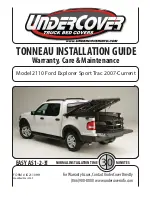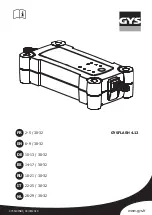
STEERING
To help prevent damage to the power steering system:
•
Never hold the steering wheel at its furthest turning points (until it
stops) for more than a few seconds when the engine is running.
•
Do not operate the vehicle with a low power steering fluid level
(below the MIN mark on the reservoir).
•
Some noise is normal during operation. If the noise is excessive, check
for a low power steering fluid level before seeking service by your
authorized dealer.
•
Heavy or uneven steering efforts may be caused by a low power
steering fluid level. Check for a low power steering fluid level before
seeking service by your authorized dealer.
•
Do not fill the power steering fluid reservoir above the MAX mark on
the reservoir.
If the power steering system breaks down (or if the engine is turned
off), you can steer the vehicle manually, but it takes more effort.
If the steering wanders or pulls, check for:
•
an improperly inflated tire
•
uneven tire wear
•
loose or worn suspension components
•
loose or worn steering components
•
improper steering alignment
A high crown in the road or high crosswinds may also make the steering
seem to wander/pull.
TRACTION-LOK™ AXLE (IF EQUIPPED)
This axle provides added traction on slippery surfaces, particularly when
one wheel is on a poor traction surface. Under normal conditions, the
Traction-Lok™ axle functions like a standard rear axle.
Extended use of other than the manufacturer’s specified size tires on a
Traction-Lok™ rear axle could result in a permanent reduction in
effectiveness. This loss of effectiveness does not affect normal driving
and should not be noticeable to the driver.
2008 05+ Mustang
(197)
Owners Guide (post-2002-fmt)
USA
(fus)
Driving
182
















































